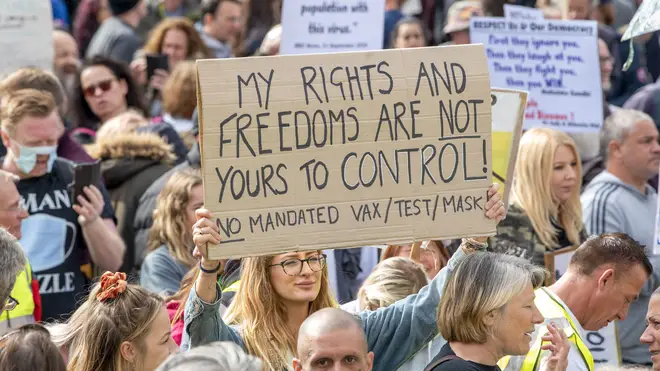
Vanessa Feltz 3pm - 6pm
15 October 2020, 00:43

Herd immunity coronavirus strategies are a "dangerous fallacy unsupported by the scientific evidence", a group of researchers have warned.
In an open letter signed by 80 international researchers and published by The Lancet, herd immunity strategies will not end the coronavirus pandemic.
Instead, the authors argued the approach would create recurring epidemics and that uncontrolled transmission in younger people would risk ill-health and death across a whole population.
They also argued that any strategy that is dependent on immunity from natural infections of Covid-19 is "flawed".
The group instead urged officials to suppress the virus until an effective vaccine becomes available.
It comes after Health Secretary Matt Hancock branded herd immunity without a vaccine as "flawed", telling MPs it was "simply not possible" to segregate the old and the vulnerable.
Read more: Cases surge but Boris resists calls for lockdown 'misery'
Read more: UK reports another 19,724 coronavirus cases and 137 deaths

"Herd immunity is a myth in the context of Covid"
The authors of the letter, referred to by its authors as the John Snow Memorandum, noted that lockdowns have harmed the economy and had a substantial impact on people's mental and physical health.
They added that this has led to "widespread demoralisation and diminishing trust" among communities.
The letter says: "The arrival of a second wave and the realisation of the challenges ahead has led to renewed interest in a so-called herd immunity approach, which suggests allowing a large uncontrolled outbreak in the low-risk population while protecting the vulnerable.
"Proponents suggest this would lead to the development of infection-acquired population immunity in the low-risk population, which will eventually protect the vulnerable.
"This is a dangerous fallacy unsupported by scientific evidence."
Read more: Sadiq Khan urges PM to grant support package for London
Read more: France declares state of emergency due to Covid-19

Health Secretary: Herd immunity is a flawed goal without a vaccine
The authors warn there is no evidence for lasting protective immunity after natural infection, and so the strategy could result in repeated waves of transmission over several years.
This would put vulnerable populations at risk for the "indefinite future", as it would not end the Covid-19 pandemic but result in recurrent epidemics, they add.
The researchers argue that defining who is vulnerable would be "complex", while prolonged isolation of large swathes of a population is "practically impossible and highly unethical".
Additionally, the authors say it is still not understood who might suffer from long Covid - when people experience symptoms months after infection.
"The evidence is very clear: controlling community spread of Covid-19 is the best way to protect our societies and economies until safe and effective vaccines and therapeutics arrive within the coming months," the letter concludes.
"We cannot afford distractions that undermine an effective response; it is essential that we act urgently based on the evidence."

Johnson explains why herd immunity wouldn't work
Speaking in the Commons on Tuesday, Mr Hancock criticised the so-called Great Barrington Declaration, which calls for lockdown measures to be relaxed and the adoption of a herd immunity approach.
Mr Hancock said: "It says that if enough people get Covid, we will reach herd immunity. This is not true.
"Many infectious diseases never reach herd immunity, like measles and malaria and Aids and flu, and with increasing evidence of reinfection, we should have no confidence that we would ever reach herd immunity to Covid, even if everyone caught it.
"Herd immunity is a flawed goal without a vaccine, even if we could get to it, which we can't."
Listen & subscribe: Global Player | Apple Podcasts | Google Podcasts | Spotify